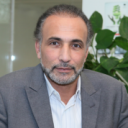
1. We must start first by condemning the violence and killing of diplomats and civilian people. Whatever we may feel, however we may be hurt by the video, it cannot justify in any way the killing of people. Such actions are simply anti-Islamic and against Muslim values. The demonstrations were in fact first organised by a tiny group of Salafi literalists who were attempting to direct popular emotions against the United States and the West in order to gain for themselves a central religious and political role. We should not confuse this tiny minority who are using a populist religious discourse, with the millions of Arabs, and mainly Muslims, who took to the streets during the Arab uprisings in a non-violent way to call for freedom, justice and dignity.
2. We should try now, after the Arab uprisings, to get a better understanding of the dynamics within Muslim-majority countries. Here we are witnessing a power struggle between Salafi literalist movements and other Islamist groups (such as the Nadha in Tunisia, the Muslim Brotherhood in Egypt and even the Sufi trends). The Salafis are attempting to destabilise the democratisation process and make themselves seen to be the true real religious authority within their society. They are utilizing these emotional popular reactions towards the recent video and nurturing the numerous frustrations of the people to fuel an anti-American sentiment and rejection — indeed they have succeeded in gathering a minority of people who then acted out of control.
We need to add to this internal tension one of the most important challenges for the future of the Middle East and that is the fracture between the Sunni and the Shi’a. We cannot understand the rationale behind the demonstrations by only considering the popular reaction to the video. There are internal political and religious challenges that we must consider and understand.
3. Whilst nothing can justify the popular violence, we must try to understand why the people are reacting so intensely. One can see that American and European Muslims, through the successive controversies in Denmark, The Netherlands, France and now the United States, are not reacting violently. Instead they take a peaceful, critical stance in spite of feeling hurt by the cartoons or the video. However that in the Southern Muslim-majority countries, the majority of people face poverty, unemployment, corruption and sometimes lack of social and political hope. From day-to-day they rely very much on their belief, the meaning of their life and the sacred in order to survive, so when they see the ‘rich and comfortable’ people of the West mocking and ridiculing what they consider to be sacred, they are doubly offended. We should not dismiss or underestimate these socio-economic factors. The whole controversy relates to many causes, rather than singularly, religion.
4. We heard the Organisation of the Islamic Conference (OIC) calling for new laws on blasphemy. I wouldn’t suggest such a way, for I don’t think that this will solve the problem. We don’t need more laws, rather each and every one of us needs more education and more understanding about the way in which we deal with our rights, our responsibilities and our living together. Pluralism is not only about legal regulations; it is about knowledge, education, ethics and respect. This is the common challenge for all our educational systems. We still may continue to be obsessed with our rights, neglecting in fact that our world asks for each of us to become more responsible.
5. If we look at what is happening with the West today and the Muslim-majority countries, the great majority of citizens are caught between two populisms. We can see now that in the United States as well as in Europe we have the tea party, the neo-conservatives, and the new evangelists that are now creating a new enemy of Islam and the Muslims — portraying them as “a cancer”, aliens and foreign citizens, outsiders within, who are threatening the very essence of Western culture. All the rhetoric is based upon fear, racism, bigotry and very often Islamophobia. On the other side we have minority Muslim groups who are indulging in a similar religious populism, advocating the fact that “we are more Muslim when we are non-Western” or clearly against the West. There is no other way but to enter into a kind of ‘clash’. The media are covering these highly visible and vocal stances and so we get a vicious circle, where each side makes the headlines, nurturing upon each other, and ending up as objective allies in this ‘clash’ of civilisations.
It is therefore critical today for the citizens caught in between these two populisms to become more vocal themselves, to create a kind of new ‘we’ in the name of the same values they advocate: proactive coexistence, mutual respect, and knowledge of one another. The common challenges are education, poverty, social justice, and understanding. The people should not be misled nor fool themselves into recognising those who are truly in the wrong. This is the very message of the Arab Muslims. Millions of people in the South are showing that they cherish the same values as Western citizens. Let us celebrate this in a reasonable way and not be driven by blind emotions.
Tariq Ramadan is Professor of Islamic Studies at Oxford University, and is President of the European Muslim Network in Brussels. His books include Islam and the Arab Awakening; What I Believe;Radical Reform: Islamic Ethics and Liberation; In the Footsteps of the Prophet: Lessons from the Life of Muhammad; Western Muslims and the Future of Islam; and Islam, the West, and the Challenges of Modernity.
This post originally appeared on the OUP blog.





No Comment